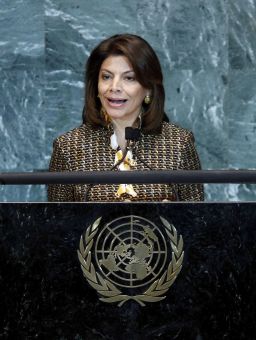Editor’s Note: The Rt Hon. Helen Clark is a former Prime Minister of New Zealand and is board chair of the World Health Organization’s Partnership for Maternal, Newborn & Child Health. Laura Chinchilla is former President of Costa Rica and a member of the Sanitation and Water for All Global Leadership Council. The views expressed here are those of the authors. Read more opinion on CNN.
Of the many indirect consequences of Covid-19, growing gender inequality is an area of grave concern where the world is falling grievously behind. While women labor at the frontlines, comprising 70% of the world’s healthcare workers, according to the World Health Organization (WHO), they are also leaving the workforce at a much higher rate than men, and doing over three-quarters of all unpaid care work, including the care of children.


This International Women’s Day, we must address gender inequality and unite through this crisis to ensure women and children are prioritized in our recovery agenda. To advance gender equity, we most prioritize the most basic rights that are still denied to women and children. Let’s start with the most fundamental of human needs – access to clean water and safe sanitation, including soap for handwashing. Too many of us take these for granted, and yet, according to the WHO, 2.2 billion people don’t have access to safe drinking water and, according to UN Water, 4.2 billion don’t have a safe place to use the toilet.
One in four health care facilities lack basic water services, according to UNICEF, and one in three don’t have hand hygiene facilities at points of care, even though handwashing with water and soap is the first line of defense against Covid-19. As healthcare facilities are overburdened during this pandemic, one study projects that within six months, the world could see up to an additional 57,000 maternal and 1.2 million child deaths.
Water and sanitation are critical pathways to transforming gender relations and can dramatically improve reproductive, maternal, adolescent and child health. In fact, basic and simple hygiene practices during antenatal care, labor and birth can reduce the risk of infections, sepsis and death for infants and mothers by up to 25%, according to the WHO. Even before the pandemic, approximately 810 women died every day from preventable causes related to pregnancy and childbirth – 94% of these deaths occurred in low and lower middle-income countries, according to UN Women.
Improving access to water, sanitation and hygiene (WASH) is not only the right thing to do – it’s what women want. In a survey of over 1.2 million women and children in 114 countries, improved access to WASH was listed as the second highest demand in maternal and reproductive care.
Even in their daily lives, women and girls are the first to suffer without clean water and decent toilets, given the traditional gender roles imposed by society. Women and girls are usually the stewards of household water and managers of household sanitation, and are most often the primary caregivers of children, the elderly and/or sick relatives. When they menstruate, they often miss work, avoid school and suffer economic losses for the family. Around the world, women and children spend 200 million hours every day collecting water, according to UNICEF. This makes up an additional 266 million hours of time each day lost because they have no toilet at home.
The WHO’s Partnership for Maternal, Newborn and Child Health has, on behalf of its over 1000 members, issued a Covid-19 Call to Action. It urges governments to protect and promote the health and rights of women, children and adolescents by strengthening political commitment, policies and financing for seven key interrelated issues. They include the advancement of gender equality and the provision of functional, safe and clean toilet and hand washing facilities, and quality potable drinking water, with a particular focus on healthcare centers, schools and centers for refugees and internally displaced persons.
Similarly, at Sanitation and Water for All, a global partnership committed to achieving universal access to clean drinking water and adequate sanitation, we are calling on governments to provide women and girls with opportunities for decision-making and access to and control of resources.
According to the World Bank, 18% of the workforce in water and sanitation are women, yet they make up less than one in four managerial or engineering staff, resulting in policies and systems that aren’t designed for women’s needs. Admirably, Uganda, Tanzania, South Africa and Peru have all adopted ambitious national policies aimed at increasing the number of women working in the water and sanitation sector and changing the way water resources are managed. More countries should follow suit.
Water and sanitation are pillars of public health and dignity – we can prevent pandemics with them, and they can save a mother or child’s life. We must unite to improve gender equality and human rights by giving women and girls the safety and dignity of clean water and sanitation and removing inequitable work burdens. This International Women’s Day, we must stand together to ensure everyone, everywhere has access to safe water and sanitation.


